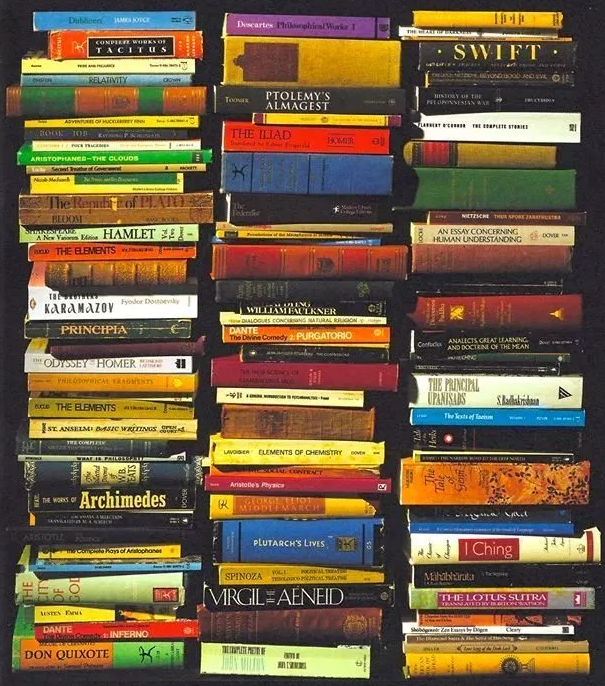I started a book club with a couple of friends. 10/10 would recommend.
Most book clubs read fiction. Most book clubs also seem to be a directed reason to get together socially. Both of those are great! But we were looking for something more than some banter about story and character interaction. We wanted to analyze ideas and think about the world around us. So we’re reading non-fiction only.
And let me tell you that the conversations so far, with a cigar and in front of a fire, have been truly great. I’ve always been a big proponent of reading. I do it all the time and so does my family. But this experience has made me realize I’ve been missing something. And that’s pointed me towards St. John’s College.
St. John’s is famous for their Great Books curriculum. Their website lays it out perfectly: they don’t highlight anything fancy, just a stack of books. And what a stack it is:

That list represents a well curated slice of the history of western thought. Western thought is important, not because it is western, but because it provides the most principled basis for understanding the world.
The books are easy to meme and tweet and they rightfully take center stage. But it’s only half of the magic formula. The rest of the story is the discussion seminars. Every week a small number of students gather with curious professors and discuss what they’re reading and exchange ideas.
William Scott Rule talks about this in his PhD thesis on the history of the Great Books curriculum. The discussion seminar for great books first become a mainstay at Columbia University. He quotes John Erskine from Columbia:
“Exchanging ideas for two hours, they will probably teach each other more about the rich aspects of Shakespere‟s [sic] genius than any one of them is likely to think out for himself, or than any lecture is likely to convey.”
And not only is the exchange great, the process is fundamentally grounded in Athens, as described by Scott Buchanan:
[During each seminar] the argument will drift and it should be followed wherever it leads, but all opinions should be advanced with reasons; this is what makes the seminar somewhat Socratic. The meanings of terms are essential – this is grammar. Persuasion of others regarding the validity of opinions is used and this is rhetoric. Understanding is sought, and this is logic. If followed, the discussions will clarify an original notion or lead to a reduction to the absurd and hence a new start.
Will Hunting may have been a genius but he was still just a punk kid who read a lot of books. His famous line that helps underline his genius: “You wasted $150,000 on an education you coulda got for $1.50 in late fees at the public library.” It’s not until Robin Williams gets through to him that we realize the only difference between Will and the Harvard student he belittles is the amount of money wasted. Will had to go out and test his ideas, explore them, take the risk of failure and see the world before he understood what everything was about.
The world is eager to move on from so-called Western Canon. At Columbia, where Great Books first started, the long-established Lit Hum class is getting some updates. Out of 29 books, the only two published in the last 50 years are Toni Morrison’s Song of Soloman (1977) and Claudia Rankine’s Citizen (2014).
Are these good books? They may be incredible. Do they stand next to Jane Austen, Dante, Virgil, Homer, and Plato? Of course not - not because of any inherent fault; they simply haven’t had the time. Dante may have been extraordinary in the 1300s - it almost definitely was - but it didn’t become Dante until it had hundreds of years of impact on everything from Italian language to the Renaissance to Papal Encyclicals. The Great Books are Great because they’ve proven to be so over hundreds of years. No book from 2014, no matter how good, can do that.
Not everyone needs to go to St. John’s and read the entire Litany they provide, but it’s worth understanding why these books are in the Canon and how fundamental they are to the entire medium of inquiry and commentary employed by our culture.
Building a non-fiction book club with good conversation helps keep us in tune with a tradition of inquiry that dates back to Socrates.
